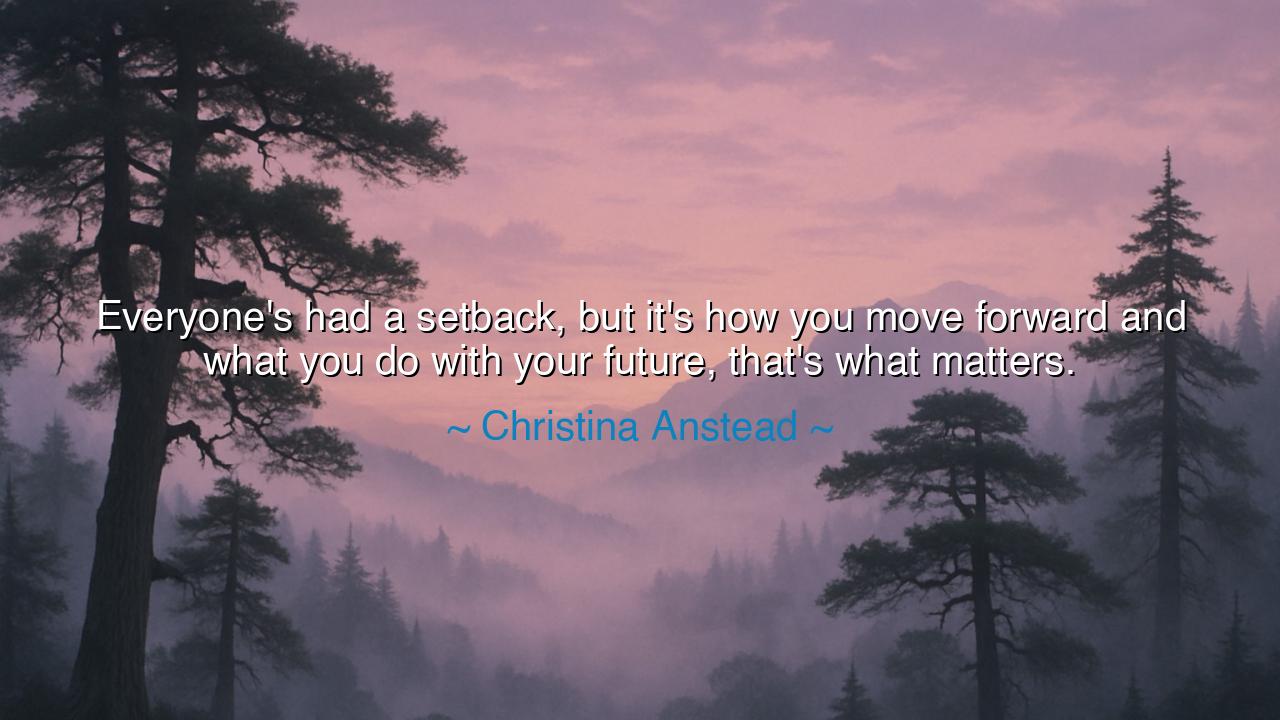
Everyone's had a setback, but it's how you move forward and what
Everyone's had a setback, but it's how you move forward and what you do with your future, that's what matters.






"Everyone's had a setback, but it's how you move forward and what you do with your future, that's what matters." These words spoken by Christina Anstead reflect a fundamental truth about the human condition: setbacks are inevitable, but it is our response to adversity that shapes our character and determines our future. Life, like the ancient heroes’ journeys, is filled with challenges, but it is through resilience, determination, and perseverance that we transcend those challenges and carve a path forward. Anstead’s words remind us that no matter the obstacles we face, what truly matters is not the fall, but the rise—the way we use our experiences to propel ourselves into a better future.
In the ancient world, the idea of setbacks and how one responds to them was central to the wisdom passed down by great philosophers and leaders. The Greek philosopher Epictetus was a powerful voice in this regard, teaching that the key to inner peace and strength lies not in avoiding adversity, but in how we choose to respond to it. He famously said, "It's not what happens to you, but how you react to it that matters." Like Anstead, Epictetus believed that we cannot control the challenges that life throws at us, but we can control our response, and in doing so, we hold the key to our own freedom and growth. The strength to move forward, he argued, lies not in avoiding suffering but in embracing it, learning from it, and allowing it to shape us into wiser, stronger individuals.
This ancient wisdom is echoed in the stories of great leaders who faced setbacks that could have easily defined their lives. Winston Churchill, the British Prime Minister during World War II, is a prime example of resilience in the face of failure. Churchill’s early political career was riddled with failures and setbacks, from being dismissed from positions of power to his initial missteps in military strategy. Yet, it was his response to these failures—his unwavering belief in the cause of freedom and his ability to rally others despite overwhelming odds—that ultimately defined his legacy. Just as Christina Anstead suggests, it was not Churchill’s early failures that shaped his legacy, but his determination to move forward and build a future based on vision, leadership, and resolve.
Consider also the example of Thomas Edison, whose countless failures in the pursuit of creating the electric light bulb did not define his life, but rather his reaction to them. Edison famously said, "I have not failed. I’ve just found 10,000 ways that won’t work." His setbacks were numerous, yet each one was seen as a stepping stone to greater success. Edison’s perspective was one of growth—he understood that each failure was not an end, but an essential part of the process of discovery. This resilience, this willingness to continue forward, despite the setbacks, was what ultimately led to his immense success. Edison’s life, much like Anstead’s message, shows us that what matters is not how many times we fall, but how we choose to rise again.
The lesson we draw from Anstead's words is one of empowerment. While setbacks may come in many forms—personal loss, professional disappointment, or unexpected challenges—it is in our ability to choose our next step that we find our true power. Just as the ancients taught that wisdom and strength come not from avoiding hardship, but from growing through it, we too must learn to use setbacks as opportunities for self-reflection, growth, and action. Life is not defined by the obstacles we face, but by how we choose to navigate them and how we move forward. In every setback, there lies the potential for renewal and transformation.
Christina Anstead’s insight challenges us to look beyond the immediate pain of failure and to focus on the future we have yet to create. What matters is not the pain we experience but what we do with that experience. The future, she suggests, is something we can shape, no matter the setbacks we encounter along the way. Just as Churchill rallied a nation in the face of war, and Edison reimagined technology despite countless failures, we too must confront our own struggles with a mindset of resilience and purpose. We must embrace the future with an open heart and a strong will, understanding that every challenge we overcome brings us one step closer to the person we are meant to become.
Let us carry forward the wisdom of Anstead, Epictetus, Churchill, and Edison in our own lives. When faced with adversity, let us not be consumed by the setbacks, but focus on the opportunity to learn, grow, and move forward. The future is not written in the moments of failure but in the choices we make afterward. In every setback, there is the potential to transform the pain into strength, to transform the loss into growth, and to shape a future that is limitless in its possibilities. It is through resilience and resolve that we craft the future we desire.






AAdministratorAdministrator
Welcome, honored guests. Please leave a comment, we will respond soon